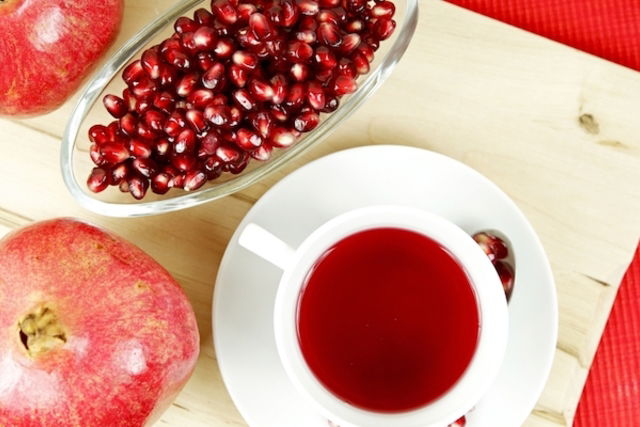Pomegranate tea is rich in polyphenols, flavonoids, alkaloids and triterpenes, which are substances with antioxidant, anti-inflammatory and diuretic action. It can be used to relieve sore throats, gingivitis or complement the treatment of diabetes or high blood pressure.
Because of its antioxidant properties, pomegranate tea can also be taken to combat cancer, boost immunity and promote weight loss.
Pomegranate tea is prepared with the peel of this fruit, and should not replace your doctor's prescribed treatment. It can be used, however, to complement medical treatments due to its diverse health benefits.

Health benefits
Pomegranate tea can be used to:
- Relieve a sore throat
- Reduce high blood pressure
- Reduce triglyceride levels
- Improve HDL cholesterol levels
- Treat diarrhea or dysentery
- Prevent gingivitis, periodontitis or stomatitis
- Manage arthritis or gout
- Promote weight loss
- Strengthen the immune system
- Maintain skin health
- Prevent Alzheimer's
Pomegranate tea contains antioxidant and anti-inflammatory action which can help to reduce cellular damage caused by free radicals. It can also be used to prevent cardiovascular diseases like atherosclerosis or heart attacks.
In addition, some lab studies [1,2,3] on cells show that pomegranate can help to prevent or help with the treatment of breast, prostate, intestinal, head and neck cancers. It is rich in antioxidants that help to reduce the growth of cancer cells and promote cancer cell death. However, more studies are needed to support these benefits.
Although it contains many health benefits, pomegranate tea should not substitute your doctor's prescribed treatment. Pomegranate tea taken to achieve health goals should be monitored by a doctor or medicinal plant specialist.
How to make pomegranate tea
The part that is normally used to make pomegranate tea is the peel, which is where active substances with medicinal properties are found.
Ingredients
- 10 g of pomegranate peel
- 1 cup of water
How to prepare
Add the pomegranate peels to a pot with water and boil. Allow it to bubble for 5 minutes, then remove from heat. Cover the pot and allow the tea to steep for an additional 5 minutes. Then wait for it to cool and drink 2 to 3 times per day.
In addition to the tea, pomegranates can be consumed in their natural form or used to make smoothies.
Possible side effects
The most common side effects associated with drinking pomegranate tea include nausea, vomiting, or stomach irritation.
When pomegranate peel tea is consumed in higher than recommended quantities, in can cause an overdose and be life-threatening. Therefore, this tea should only be consumed for health means as directed by a doctor or medicinal plant specialist.
Pomegranate tea can cause severe allergic reactions that require immediate medical attention. You should stop treatment and look for urgent medical attention if you notice symptoms like difficulty breathing, wheezing, a tight throat, mouth, tongue or facial swelling, or intense itching.
Contraindications for use
Pomegranate tea should not be consumed by children under 2 nor by women who are pregnant or breastbeeding. It should also be avoided by people with stomach ulcers, as it can further irritate the stomach.
Pomegranate tea should additionally be avoided by anyone with an allergy to this fruit.
